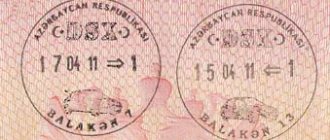There are two ways to cross the customs zone: along the “red” or “green” corridors.
Travelers who do not have items to declare in their luggage follow the “green” corridor. From the point of view of the law, crossing the border of this corridor is equivalent to a citizen’s verbal confirmation that he is not carrying goods that should be included in the declaration. But a customs officer can always check what a person is carrying. If he discovers things that must be included in the declaration, this will be a violation of the law. The degree of punishment depends on the goods transported and their quantity. In some situations, a fine is possible, and in others, criminal liability.
The “red” corridor is provided for persons importing goods, the inclusion of which in the declaration is mandatory. This means that their luggage contains things or items that are subject to duty or there are restrictions on their value. By the way, at some international airports in Europe there is also a “blue” corridor, but only citizens of the European Union pass through it.
Alcohol and tobacco products
Only for passengers arriving by any mode of transport other than air for a stay of more than 72 hours. This rule does not apply to transit passengers.
- 1 liter of alcohol with a strength of over 22% (cognac, vodka, gin, tequila, rum, whiskey) for persons over 20 years of age
- OR 2 liters of aperitif with a strength not exceeding 22% (martini, cinzano, liqueur, fortified wine) for persons over 18 years of age
- OR 2 liters of sparkling wine (alcoholic cocktails in cans, such as gin and tonic, are equivalent to spirits) for persons over 18 years of age
- And 2 liters of still wine (red, white, rose) for persons over 18 years of age
- And 16 liters of beer for persons over 18 years of age.
A private person is prohibited from importing alcohol and powder for the production of alcoholic beverages. When entering for less than 72 hours, it is prohibited to import alcohol.
Tobacco products (only for passengers arriving by any mode of transport other than air for a stay of more than 72 hours. This rule does not apply to transit passengers).
- 200 cigarettes or 100 cigarillos (weighing no more than 3 g) or 50 cigars or 250 g of smoking or pipe tobacco (for persons over 18 years of age).
If you are traveling for less than 72 hours, you can take a few packs of cigarettes (within reason, for personal use). Customs will estimate their number based on experience with cigarette smuggling and regular smokers. A person under 18 years of age has no right to import tobacco products or nicotine liquids into the country.
Accommodation in a hotel/cottage
When checking into a hotel you must present your passport and voucher. Check-in time is usually no earlier than 14.00 when rooms are ready. Things can be left in the hotel's storage room until check-in time, if available. In case of difficulties with accommodation, please contact the company representative at the resort or the PAC24 service by calling +7, 24 hours a day.
Upon departure from the hotel
Checkout time is usually 09.00 – 12.00. Do not forget to pay in advance for additional services at the hotel: telephone calls, use of a minibar, laundry, dry cleaning, etc.
Before using the service, find out how much it costs. In the event of a conflict situation with the administration of a hotel or restaurant (for example, refusal to pay for services), a representative of the administration has the right to act in accordance with the laws (calling the police with rather unpleasant consequences).
There are no ironing rooms in the hotels; the use of irons in the rooms is upon request at the reception. Before handing over items to the laundry, find out the order completion time (usually at least 24 hours).
Check-in to the cottages begins after 16.00 on the day of arrival. The cottage must be vacated before 12.00 on the day of departure.
The number of residents in a cottage should not exceed the number of beds.
The tourist is financially responsible for damage to property in the cottage, as well as for loss of keys. Before leaving the cottage, tourists must remove their bed linen, wash the dishes and take out the trash - this is not included in the final cleaning price.
Food
- The import of meat, meat products, milk and dairy products into Finland is prohibited. (As an exception, a passenger may import for personal use breast milk substitutes, food products for infants, food products consumed for medical reasons, if the volume does not exceed 2 kg).
- Chicken eggs can be imported in a volume not exceeding 2 kg, since they are products of animal origin that can be imported in a volume of no more than 2 kg.
- It is allowed to import 20 kg of seafood or one whole cleaned fish, regardless of its weight. Sturgeon caviar in an amount of no more than 125 grams.
- Dry food products, vegetables and fruits can be imported for your own use.
Cigarettes
Regulations for the import of cigarettes into Finland came into effect in 2021. Among them are the following:
- According to Finnish customs regulations, EU citizens have the right to transport cigarettes. But imported tobacco baggage should not exceed 200 pieces. You can also transport 100 cigarillos, 50 cigars or 250 g of tobacco. However, if a person uses Finnish territory as a transit zone, this restriction does not apply to him.
- Another rule: a citizen of the European Union is allowed to import cigarettes provided that he stays in Finland for at least 3 days.
- If people have imported cigarettes that have warning labels in Finnish or Swedish, then there will be no restrictions on their quantity.
As for tourists who are going to be in the country for less than 72 hours and the tobacco cargo they imported, responsibility for this falls on customs workers. They must determine whether the tourist is a smoker or a smuggler. Violation of these customs regulations carries criminal penalties. Therefore, the Finnish border monitors all violators very carefully.
What needs to be declared
- Cash, if the amount exceeds 10,000 euros. Cash in excess of 10,000 euros not declared in the declaration is subject to confiscation. There is no need to declare funds on plastic cards.
- Goods subject to duty, excise duty, VAT, other tax or payment in Finland, or goods whose import is restricted (animals and plants; goods made from endangered animals and plants; firearms, ammunition and dangerous bladed weapons). Prohibited items found while crossing the border are confiscated, and even a fine or other punishment may be imposed for their possession.
2021 standards
Finland established rules for the behavior of visitors when passing through customs in 2009, and they continue to apply in 2021. At the border with Finland, there is an inspection system that meets EU standards. This regulation contains a list of goods prohibited for import.
To import anything into Finland, you should familiarize yourself with these regulations in advance. Without knowledge of the rules for exporting products from Finland, it is also difficult to avoid problems. All restrictions are described in these regulations.
Goods prohibited from import into Finland
You cannot import into Finland:
- narcotic substances (without permission),
- firearms and ammunition, air guns, gas cartridges and bladed weapons, including automatic opening knives (import restrictions), (see explanation below)
- brass knuckles, stilettos, flails and other metal weapons disguised as other objects, as well as stun guns, batons, telescopic batons and throwing bladed weapons,
- recordings that violate copyright, in particular, counterfeit CDs, DVDs, media with computer games and computer programs (including for your own use),
- plants (cut flowers can be imported for personal use, no more than 20 pieces),
- radar detectors,
- table and seed potatoes,
- soil, compost and manure,
- A permit is required for the import and export of endangered animal species and products made from them. A CITES permit is required, in particular, for the import of ivory, coral, many reptiles and products made from them,
- more than 5 living plants (there are restrictions),
- more than 3 kg of bulbs, tubers and flower rhizomes,
- more than 3 kg of fresh citrus fruits,
- more than 500 g of seeds,
- more than 20 pieces of cut flowers,
- pyrotechnics.
Please note that on the border with Finland at the Salla and Lotta checkpoints, the import of food products (except tea and coffee) is prohibited, since there are no border veterinary and phytosanitary control units at the checkpoints. For the same reason, it is prohibited to import products of animal origin, live animals, including pets and food for them, as well as plant products: fresh flowers in a bouquet or in a pot, lawn grass, seedlings, etc. At checkpoints in Murmansk region: Murmansk Airport and Murmansk Seaport - and Leningrad region: Torfyanovka international checkpoint, Svetogorsk international checkpoint, Brusnichnoye international checkpoint, there is phytosanitary control.
International border checkpoints on the border between Finland and Russia
The Finnish border can be crossed by car or train at the following border points:
- Raja-Jooseppi – Lotta
- Salla – Salla
- Vartius – Lyuttya
- Niirala – Vyartsilya
- Kuusamo – Suoperä
- Imatra – Svetogorsk
- Nuijamaa – Lingonberry
- Vainikkala – Buslovskaya
- Vaalimaa – Torfyanovka
Which knives can you carry with you and which ones can’t?
The possession of knives in Finland is regulated by the Public Order Act. The manufacture, import into the country, sale and storage in a public place (also applies to a car) of automatic knives with frontal ejection of the blade (stilettos) and bladed weapons disguised as another object is prohibited. Checkpoints are public places.
By law, an automatic switchblade (stiletto) is a knife whose blade is stored in the handle and removed from it by frontal ejection using a spring or other mechanism. According to experience, such knives are poorly suited for everyday use, for example, when cleaning fish or slicing bread.
Automatic knives with frontal ejection of the blade are the only type of knives whose storage is completely prohibited. Allowed types of knives are: Finnish knives, bread knives, folding knives without automatic blade extraction (i.e. Swiss Army knives), knives in multifunction tools. Regular knives (not automatic switchblades) in Finland can be stored in a vehicle and on private property, for example, at home or in the country. At a checkpoint that is a public place, knives should be kept in the car or in a bag in the car. Such knives cannot be carried on your person: in a pocket, on a belt or in a handbag/handbag.
The purpose of the law is to prevent dangerous situations when a person with a knife in his pocket, in case of irritation, in a fit of anger, wants to cause bodily harm to others.
Finnish law enforcement authorities advise passengers and motorists to leave all types of knives at home, if possible, while traveling to Finland. If, when crossing the border, you have doubts about whether an item is subject to a mandatory Finnish permit, or what the method of storing the item should be, we recommend choosing the “red corridor” of customs and discussing the issue with representatives of Finnish customs.
Let us remind you that the restrictions listed here apply not only to checkpoints on the Finnish-Russian border, but also throughout the entire country.
Car rental and road safety
To rent a car you need a valid driver's license, at least 1 year of driving experience, a minimum age of 19-25 years (varies among different companies), payment is almost everywhere by credit cards.
The condition of roads in Finland is excellent. The road network covers the entire territory of the country. Finland is a right-hand drive country; overtaking is done in the left lane. Driving in Finland is a relatively calm and enjoyable experience, but in winter, due to the northern weather conditions, extreme caution must be taken on the roads. The use of winter tires is mandatory from the beginning of December to the beginning of March, and it is also recommended that the car have an engine preheating system. All passengers in the vehicle must wear seat belts. Low beam headlights must be on at all times, regardless of the time of day.
Motorists are also advised to be extremely alert for moose and deer, which often wander onto roads and cause serious accidents. These animals are most active at dawn and in the evening.
Please note that not all gas stations accept credit cards from foreign banks.
Basically, the speed in populated areas is limited to 40-60 km/h, on highways - 120 km/h.
It is prohibited to drive vehicles under the influence of alcohol or drugs. The permissible alcohol content is 0.5 ppm. During the trip, the driver does not have the right to use a mobile phone without a headset (hands free).
Car requirements:
- Driver's license. Russian rights are valid in Finland; nothing additional is required. A driver's license issued in Russia or the USSR is also valid in Finland.
- Serviceability of headlights, turn signals, brakes, wheels and steering. When driving on the roads 24 hours a day and all year round, headlights must be turned on. It is recommended to keep the low beams on also in populated areas.
- The minimum permissible tread depth for summer wheels in Finland is 1.6 mm. It is prohibited to use winter and summer tires at the same time.
- The use of radar detectors is strictly prohibited in Finland. Even a non-activated radar in the glove compartment of your car is a violation of the law.
- A temporary driving permit is not valid in Finland.
- Green card (“green card”) is a civil liability insurance policy for car owners in Europe. The easiest way is to purchase a Green card at a Green Card sales point near customs.
- The presence of a sticker belonging to your country (RUS, for example).
- No tinting on car front windows. Tinting of the windshield and front windows is permitted only within the limits permitted by the manufacturer.
- The light transmittance of the windshield must be at least 75%, and of the front side windows - 70%. Many car manufacturers darken the windows to the maximum, but the glass still appears clear. Additional darkening, for example with light-protective film, is prohibited in Finland. And this requirement of the Finnish side is so serious that in the event of such a situation, you have to either turn home to your homeland, or remove the film right at the border.
- Winter tires and studs. Winter tires (without studs) can be used all year round, however, from December 1 to the last day of February, a period of mandatory use is established, and the tread depth of this type of tire must be at least 3 mm. The rubber must have a stamp (M+S). The use of winter tires with studs is allowed only in the period from 01.11 to 31.03, but it is allowed to exceed the established deadlines if the use of these tires is necessary due to weather conditions. The use of summer tires with a tread depth of at least 1.6 mm is permitted from 01.03 to 30.11 (that is, in the summer you will not be allowed on “bald” tires either).
- Finns don’t ask for vehicle inspection tickets.
What documents are required to transport air guns?
The import of weapons into the country is determined by the Finnish Firearms Law. Pneumatic (traumatic) pistols are prohibited in Finland. On the other hand, hunting rifles can be brought into Finland for personal use, provided that the owner has a permit for it in his country of residence. The owner must additionally obtain an import permit for the gun from the Finnish police department. A Finnish permit must be issued before bringing weapons into the country.
You can find out about possible changes to customs regulations on the website of the Finnish Customs Service .
Share link:
- Tweet
- Telegram
- by email
Finnish customs and Russian language
Many Russian tourists who go on vacation in Finnish nature for the first time are afraid of language problems at Finnish customs. Don't be afraid, almost all customs personnel speak Russian at the required level, allowing you to ask you standard questions and understand your answers. The main thing is to answer clearly and to the point.
Customs officers ask questions not to block your path at any cost, but to make sure that you understand the purpose of your visit to the country and the permissible length of stay. If necessary, the employee will explain some errors in your judgment and tell you, for example, when you should leave back so as not to accidentally break Finnish laws.
Background information on Finland
The advantages of Finland are considered to be political stability, openness of the economy, well-developed infrastructure and reliable telecommunications, as well as a high level of interaction between enterprises, scientific and technical centers and universities. In addition, Finland's high competitiveness in the world is ensured by such factors as the speed and confidence in the development of new technologies, the high educational level of the population, and a business climate favorable for large and small businesses. However, despite this, the disadvantage of the country can be considered relatively high taxes, compared to other developed EU countries.
One of the most important freight transportation hubs in this direction is the port city of Kotka. Cargo is delivered here both from Finland and other countries, for example, from China. Depending on the need and economic feasibility, cargo transportation is carried out in various ways. The company's employees can organize the meeting of cargo in Kotka and subsequent delivery of goods from Finland to St. Petersburg, their customs clearance. The second option is the delivery of goods from the country of departure by sea via Kotka. In each specific situation, the cargo owner is offered the most optimal way: transporting the cargo to the desired terminal or transporting it to a temporary storage warehouse.
Delivery of small cargo from Finland has its own characteristics. Traditional transportation options in such a case are not cost-effective and lead to unnecessary costs for the cargo owner for its transportation and customs clearance. In such situations, groupage cargo is delivered from Finland. In order to minimize customer costs, our company’s employees carry out daily delivery of small cargo to one destination, after which the consolidated cargo is transported from Finland to Russia. Delivery of groupage cargo from Finland is the best option in situations where the volume of cargo is not large and international cargo transportation is not often required.
Consolidated cargo from Finland is delivered, as a rule, to consolidation warehouses located in places with favorable transport and geographical locations and providing transport links with various countries. In this way, the delivery of small cargo within the country is optimized, after which groupage cargo from Finland is sent by road to Russia. After customs clearance and clearance, the consolidated cargo is transported to the destination city. The cost of transporting goods by road from Finland in this case costs the client much less than separate transportation of small-sized cargo.
Customs clearance of goods is one of the most important aspects in the field of international cargo transportation. For the transportation of goods from Finland and their subsequent customs clearance is the main activity. Freight transportation is carried out from Finland to St. Petersburg, where customs clearance takes place. Our company also carries out customs clearance of cargo in Vladivostok, Moscow, Nakhodka and other cities. Transportation of goods from Finland is carried out to the city with the most favorable location for the client. So, for example, for clients from the capital, the Moscow region or the Central region, the best option would be to transport containers from Finland to Moscow.
At first glance, to a person who is far from international cargo transportation and customs clearance, the procedure for customs clearance of goods seems very simple. At its core, it includes two stages: customs clearance and payment of duties. In reality, this process turns out to be much more complicated.
One of the features of customs clearance of goods is compliance with all existing regulations in Russia regarding road transport from Finland, as well as with regard to filling out the necessary documentation. When carrying out customs clearance of goods, it is necessary to take into account many nuances, from the correct packaging of the goods and the mandatory conditions of transportation from Finland, to the filling out of various documentation. Many delays at customs also arise due to inconsistency in the actions of various services: customs, certification bodies, etc. No less delays are caused by the constantly changing customs legislation of the Russian Federation. Only a professional can track all changes and carry out customs clearance of cargo in full compliance with legal norms.
The professional approach of our specialists allows us to guarantee the highest quality of services provided. Thanks to our approach to work, delivery from Finland is carried out by our company regularly and on time.
For clients who need customs clearance of goods from Finland, prices are one of the most important issues. You can find all the necessary information about the services provided by our company, delivery, customs clearance of goods, prices and guarantees on the website, or by calling 5. An application for calculating the cost of services for the delivery and customs clearance of goods from Finland can be sent directly on the website by filling out the appropriate form.
Benefits of working with us
- We work 7 days a week 365 days a year
- Highly qualified specialists with extensive experience
- We bear full responsibility for the clearance of goods at customs
- We process any goods at any customs in Russia
Are commercial imports subject to tax?
If a citizen of the European Union comes to the country with any goods that he plans to use for commercial purposes, he will have to pay customs duties and other taxes for it. This rule applies to all goods for which a person plans to receive compensation.
When is an import not considered commercial? If it is unsystematic, that is, a person can take certain things with him as gifts. In this case, such baggage is not subject to any tax.
Sample of a completed declaration to Finland
Commercial goods at the Finnish border must be declared. Without this, their import is impossible. Commercial baggage can be declared either orally or in writing. What else must be declared? Cash brought by tourists from EU countries. But if the amount does not exceed 10 thousand euros, then it is not declared.
The passenger customs declaration form can be downloaded here.
As for goods, products and things whose purchase amount does not exceed 430 euros, there is no need to pay duty for them. It must be remembered that the right to import certain things is individual. This means that if customs workers suspect a foreign tourist of any fraud or fraud, he will be detained at the border until the circumstances are clarified.
Petrol
Drivers should also note that there are some restrictions on fuel. It is allowed to fill the tank full and take an additional 10 liters in a canister. By law, these 10 liters are not subject to duty.
But if you have more than 10 liters of fuel, you will need to pay a fee. In one of our next materials you can see the location of gas stations in Svetogorsk and Imatra, the rules for using automatic gas stations, and you will also find out how much gasoline costs in Finland.
Pets
To travel with a pet, you need to comply with several points.
- To travel, choose the red corridor; this is where the veterinarian checks.
- A CITES certificate will be required.
- The animal must have a veterinary passport. It must contain notes on timely vaccination, deworming, and rabies vaccinations.
- It is necessary to have a certificate of satisfactory health of the animal. She is taken at the state veterinary hospital no later than three days before departure.
Pharmaceutical products
The import of pharmaceutical products and toxins, the import and export of drugs and radioactive components is prohibited in the absence of proper permission for their transportation. For their own use, a tourist can transport medicines from an EEC country for a maximum period of up to three months. The transportation of medicines considered narcotic products for private use and intended for use for a maximum of 14 days is permitted. Products that can be purchased in Finland can only be imported with a prescription.










